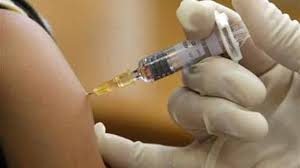
Vaatsalya Clinic
IMMUNIZATION
Immunizations are an important part of keeping young children healthy.
Vaccines help make you immune to serious diseases without getting sick first. Without a vaccine, you must actually get a disease in order to become immune to the germ that causes it. Vaccines work best when they are given at certain ages. For example, children don’t receive measles vaccine until they are at least one year old. If it is given earlier it might not work as well.

How do Vaccines Work?
Vaccines “teach” your body how to defend itself when germs, such as viruses or bacteria, invade it.They expose you to a very small, very safe amount of viruses or bacteria that have been weakened or killed.Your immune system then learns to recognize and attack the infection if you are exposed to it later in life.
As a result, you will not become ill, or you may have a milder infection. This is a natural way to deal with infectious diseases.
Why We Need Vaccines?
For a few weeks after birth, babies have some protection from germs that cause diseases. This protection is passed from their mother through the placenta before birth. After a short period, this natural protection goes away.
Vaccines help protect against many diseases that used to be much more common. Examples include tetanus, diphtheria, mumps, measles, pertussis (whooping cough), meningitis, and polio. Many of these infections can cause serious or life-threatening illnesses and may lead to lifelong health problems. Because of vaccines, many of these illnesses are now rare.
Safety of Vaccines
Some people worry that vaccines are not safe and may be harmful, especially for children. They may ask their health care provider to wait or even choose not to have the vaccine. But the benefits of vaccines far outweigh their risks.
The American Academy of Pediatrics, the Centers for Disease Control and Prevention, and the Institute of Medicine all conclude that the benefits of vaccines outweigh their risks

IMMUNIZATION SCHEDULE
Unfortunately, keeping up with the schedule can be confusing; particularly since it changes periodically, and new vaccines and combinations of vaccines are constantly being developed. Your child’s particular immunization schedule will depend on the particular combinations and sequence of previous vaccines.
- Your child’s schedule of well-child visits does not change based on the immunization schedule. The appropriate vaccines are given at each well-child visit.
- Shots are given at most of the physicals between ages 2 months and 18 months.
- The primary vaccine series will be completed by 18 months of age. After that, only 3 booster shots are needed between ages 4-6 years.
There are a few constants that may help you keep track of your child’s schedule:
The immunization schedule is developed based on extensive research on the optimal timing and spacing of vaccine doses to give maximal intensity and duration of immune system response and protection from disease. Recommendations and guidelines on vaccines are developed by the medical and public health communities and are revised annually and as needed.
Below is the recommended vaccine schedule at VAATSALYA WOMAN AND CHILD CARE CLINIC, considering the combination vaccines we currently use.
VACCINATION RECORD
|
AGE |
VACCINES |
DUE ON |
GIVEN ON |
WEIGHT (KG) |
HEIGHT(CM) |
HEAD (CM) |
|
AT BIRTH |
B.C.G. |
|||||
|
OPV0 |
||||||
|
HEP B 1 |
||||||
|
6 WEEKS |
DTwP1/DTaP1 |
|||||
|
IPV1 |
||||||
|
HEP B2 |
||||||
|
Hib1 |
||||||
|
Rotavirus1 |
||||||
|
PCV1 |
||||||
|
10 WEEKS |
DTwP2/DTaP2 |
|||||
|
IPV2 |
||||||
|
Hib2 |
||||||
|
Rotavirus2 |
||||||
|
PCV2 |
||||||
|
14 WEEKS |
DTwP3/DTaP3 |
|||||
|
IPV3 |
||||||
|
Hib3 |
||||||
|
Rotavirus3 |
||||||
|
PCV3 |
||||||
|
6 MONTHS |
OPV1 |
|||||
|
HEP B3 |
||||||
|
7 MONTHS |
FLU(0.25ml) 1 |
|||||
|
8 MONTHS |
FLU(0.25ml) 2 |
|||||
|
9 MONTHS |
MMR 1 |
|||||
|
OPV 2 |
||||||
|
10 MONTHS |
TCV 1 |
|||||
|
12 MONTHS |
HEP A 1 (L/I) |
|||||
|
15 MONTHS |
MMR 2 |
|||||
|
16 MONTHS |
VARICELLA 1 |
|||||
|
18 MONTHS |
DTwPB1/DTaPB1 |
|||||
|
IPV B1 |
||||||
|
HIB B1 |
||||||
|
PCV B1 |
||||||
|
19 MONTHS |
HEP A 2(INACT) |
|||||
|
2 YEARS |
PNEUMO 23 |
|||||
|
2.5 YEARS |
TYPHOID B1 |
|||||
|
3 YEARS |
MENINGOCOCCAL |
|||||
|
4.5-5 YEARS |
DTwPB2/DTaPB2 |
|||||
|
OPV3 |
||||||
|
4-6 YEARS |
VARICELLA 2 |
|||||
|
6 YEARS |
MMR 3 |
|||||
|
10 YEARS |
Tdap/Td |
|||||
|
Girls > 10 yrs. |
HPV 0 |
|||||
|
HPV 1 |
||||||
|
HPV 3/6 |
||||||
|
FLU VACCINE EVERY YEAR |
||||||
© Vaatsalya Clinic. All rights reserved. Website Designed by Shaivali Joshi and Jimmy Thakkar.